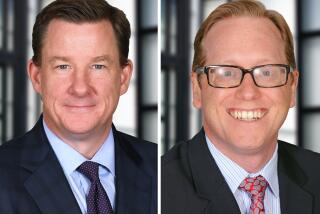Legal-Eagle Hawking : More Law Firms Are Doing Marketing
- Share via
They don’t like it. They say maybe they don’t even need it. Or they have it, but call it something else. Nonetheless, law firms are marketing.
Not just the time-honored wining and dining, hobnobbing with the social and business elite and playing host at stadium sky boxes. And certainly not the daytime TV, low-budget pitches favored by the personal injury and worker’s compensation attorneys.
But real, college-taught marketing: brochures and seminars, extensive databases and mailing lists, newsletters and slick proposal presentations, often shaped by a marketing director and executed by a marketing staff.
Legal marketing is new, breaking century-old traditions in just a couple of years. It’s growing--and fast--while still, by all accounts, defining itself. And it is perilous for those who do it, in large part because it taps into nearly every touchy aspect of the identity crisis gnawing at law firms today.
The profession of law is evolving into the business of law, putting increasing economic pressures on a male-dominated power structure already struggling to include women, minorities and non-lawyer professionals.
On the subject of marketing, Robert K. Montgomery, partner in charge of client relations at the state’s largest law firm, Gibson, Dunn & Crutcher, is a self-described “dinosaur” who believes that the best way to attract and retain clients is good legal work.
He believes that it is “tragic” to describe the law as a business. And he says many law firms using marketing are “kidding themselves thinking they are a business, like selling widgets--only they are selling billable hours.”
Yet Los Angeles-based Gibson Dunn became what Montgomery calls a “latter-day convert” in April when it lured Robin Iori away from public relations giant Hill & Knowlton to be its marketing director. In doing so, it joined an estimated 2,000 law firms across the country that have hired marketing professionals--many of them in response to the sluggish economy of the past 18 months.
Only five years ago, the National Law Firm Marketing Assn. was a fledging group of about 50. Now it claims more than 900 members. It attracted even more during the last two months to a series of conferences designed to help marketing professionals fit their skills to the legal environment.
The biggest customers of legal services--large corporations--give legal marketing efforts generally poor reviews thus far. But they say they expect to see a lot more--and better--marketing in the future.
“It’s still in its infancy stage--not very advanced,” said Peter D. Zeughauser, vice president and general counsel for Irvine Co. in Orange County. “It’s talked about a lot. Most in-house lawyers, my colleagues . . . find law firm marketing ineffective.”
But Zeughauser, who is popular on the speaking circuit these days for his advocacy of selecting outside counsel through competitive bidding, believes that marketing can be beneficial. “It is a benefit in the sense that it makes me more aware, in an easier way, of what practice areas the different firms excel in,” he said. “So if I have a particular matter that requires a lawyer in that practice area, a well-marketed firm emphasizing that area is more likely to come to my mind.”
While that’s just the effect firms hope for, many lawyers shy away from techniques that might be considered beneath the dignity of lawyers--notwithstanding the lifting of prohibitions on attorney advertising more than 10 years ago. Their longstanding antipathy toward sales is shared by their corporate counsel colleagues.
In a survey of general counsel conducted this year by Coopers & Lybrand for the National Law Journal, 86% of those responding said they “ignored” telephone sales calls, and the journal reported that some in-house attorneys “find them offensive” and are “insulted by them.”
This ambivalence toward marketing, per se, is commonplace in the legal community, especially in areas such as Los Angeles, where the market for legal services remained strong longer than in other areas of the country.
Edmund Kaufman, co-chairman of the executive committee at Irell & Manella in Century City, said: “Traditionally, we sold services just by being good lawyers. During the 1980s, when business was booming, good lawyers in good firms were operating at such a high degree of capacity that no one thought much about marketing. Now, there are a lot more lawyers, a lot more firms competing--particularly in the Los Angeles area--and there’s more focus on trying to market law firms in a more organized fashion.”
Even so, Kaufman said, “marketing on our level, to major corporate firms, is almost an anathema to our normal predilections, as professionals, and advertising, particularly, somehow doesn’t sound like something we ought to do.”
Still, Irell & Manella uses an outside public relations consultant and last spring hired its own in-house marketing person.
Paul, Hastings, Janofsky & Walker, another large Los Angeles firm, is by no means a latecomer to the trend. Its four-person “practice development” staff is headed by Byron Sabol, a longtime public relations specialist who joined the firm five years ago.
Yet the law firm is adamant that Sabol’s role is not marketing. He is Paul, Hastings’ “director of practice development, which we view as a distinction,” said Nancy Abell, a firm partner and executive committee member who oversees practice development.
At other law firms, and in other professions such as accounting that already have welcomed marketing experts, strategies of assessing and responding to clients’ needs and market forces are indeed considered part of marketing.
Gibson, Dunn’s Iori said she has “tremendous support” from the firm’s ranking partners and believes that part of her successful integration into the firm is because her job was well-defined. Her role, she said, is to coordinate information, implement plans made by the partner committees and “facilitate what the attorneys have been doing” for many years in business development.
But it is not always so smooth. Turnover in legal marketing is rapid; tenure for a firm’s first marketing staff member is typically less than a year. In part that’s because legal marketers, many of whom come from public relations agencies, are molding a new field. But also, they say, it can be chalked up to lack of a clear job description and attorneys’ reluctance to accept marketing.
Lawyers have always done their own marketing--those who bring in large amounts of business are called “rainmakers”--and many are reluctant to cede part of their role to non-lawyers.
Marcelline O. Johnson, marketing director at Chapman & Cutler in Chicago, has seen this in the three legal marketing positions she has held the past eight years. “We are dealing with extremely self-confident individuals. It’s a slow educational process,” she said. “I work with those who seem to want help, and . . . as they find it helped and made a difference to them, they are the best spokesperson” for marketing.
Legal marketing is dominated by women. Two years ago, the membership of the National Law Firm Marketing Assn. was 85% women. Today, it is 68% women, according to Ellen G. LoCurto, executive director of the Northbrook, Ill.-based group.
Even as attorneys have found it difficult to share power with women and minority attorneys, they find especially difficult the changes that are bringing more non-lawyer professionals into the firm: financial officers and administrators, and now public relations and marketing professionals.
That hasn’t been a problem, though, for Loren Wittner, who is in charge of marketing, client relations and planning for highly regarded Winston & Strawn in Chicago. Wittner, in fact, is an attorney. He practiced law for 16 years, went into government, then became an executive at Edelman Public Relations agency. Winston & Strawn was one of his clients.
In early 1990, Wittner joined the law firm as a partner. He does not practice law, but concentrates solely on marketing and business development--a position he believes to be unique.
He agrees that lawyers more readily accept other lawyers as equal professionals. “A lawyer somehow seems to find it easier to deal with other lawyers . . . and being a lawyer eliminated right off the bat some of the barriers that might have existed” to his role in the firm, he said. “I know there is more ready acceptance of lawyers; whether that should be the case or not, I think it’s true.”
More to Read
Inside the business of entertainment
The Wide Shot brings you news, analysis and insights on everything from streaming wars to production — and what it all means for the future.
You may occasionally receive promotional content from the Los Angeles Times.










